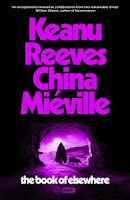There are many a writer looking for the golden path—the key to unlock the secret to bestselling success. And then there is China Mieville. Wielding his own key since the beginning, he has even taken his endeavors beyond fiction, not producing a new story since 2016. For whatever reason, perhaps because he's a fan of John Wick, perhaps The Matrix, or more likely Bill & Ted's Excellent Adventure, Mieville chose to team up with Keanu Reeves in 2024 to adapt Reeve's graphic novel BRZRKR to the written word. The Book of Elsewhere is the result.
The Book of Elsewhere tells of an immortal superhero trying to gain mortality. Echoing Neo's character arc from Matrix, our man BRZRKR has punched, kicked, ripped, and torn his way through history, sometimes winning, sometimes, sometimes, losing, sometimes dying, but always coming back to life—no matter how hard he tries to stay dead. Also ignoring time and mortality is a pig, yes, a pig, who uses every chance he gets to stick his tusks in BRZRKR. But there is alight at the end of the tunnel. BRZRKR meets a scientist who begins examining the immortal man, and may be able to uncover the key to his mortality.
The Book of Elsewhere makes for an odd “return” for Mieville. Peel away Mieville's baroque prose and you've got a relatively familiar super-hero story. To be clear, its skin is unique to the IP, but its bones are familiar to everyone even remotely familiar with popular culture. At its core, it just doesn't fit alongside Mieville efforts to date.
It is Mieville's prose which makes up the difference—that does the heavy lifting. And it accomplishes two things. One, it lends what is otherwise a superficial story some gravitas. The dense diction makes for a moody tale, punctuated byy not. bouts of ultra-violence. It defines a giant amount of the novel's character. Moreover, the reader can feel Mieville is relaxed—genre story, how can I fuck this up? And so they relax into it. Second, it reaches toward substance. Again, I think that ultimately the novel is not that substantive, but the prose certainly gives that impression. Mieville does a good job at selecting scenes which indirectly move the plot, and by setting scenes in an intellectual manner.
Another element of The Book of Elsewhere which helps elevate a degree or two above pulp fiction is the editing. Chopped up and temporally re-arranged, the novel is a shotgun blast of scenes the reader must piece together pellet by pellet. There is a learning curve. I love this; some readers may not.
In the end, The Book of Elsewhere is a comic book dressed nicely in a tailored 5th avenue suit. Mieville's dense style (a William Gibson take of a graphic novel) complements the sophisticated story presentation. It tells of an immortal man with super-human powers chased through time by an uber-villain. Though limited based on that form, Mieville nevertheless adds something, making it worth at least a read for readers for whom the premise is not entirely off-putting.


No comments:
Post a Comment